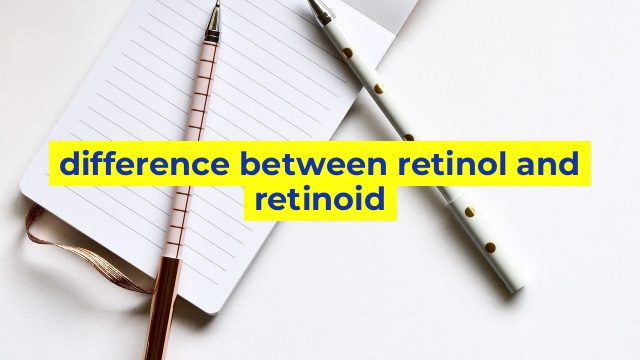Difference Between Retinol and Retinoid
Retinol and retinoid are often used interchangeably in skincare products, but they are not the same thing. Both retinol and retinoid belong to a class of compounds called retinoids, which are derivatives of Vitamin-A. However, there are some key differences between the two.
Retinol
Retinol is a pure form of Vitamin-A and is the most common type of retinoid found in over-the-counter skincare products. It is generally considered more gentle than retinoids prescribed by a dermatologist, and it is also less potent. Retinol works by penetrating the skin and being converted into retinoic acid, which helps to boost collagen production, improve skin texture, and reduce the appearance of fine lines and wrinkles.
One of the advantages of retinol is that it is less irritating than prescription-strength retinoids. Retinol is also less potent than prescription-strength retinoids, meaning that it may take longer to see results. Retinol is available in various concentrations, ranging from 0.1 to 1 percent, and it can be included in creams, serums, and gels.
Retinoid
Prescription-strength retinoids, or retinoic acid, are more potent than retinol and are available only with a prescription from a dermatologist. These retinoids are stronger and can be more effective at treating a range of skin issues, including acne, sun damage, and hyperpigmentation.
Retinoids work by speeding up cell turnover, which means that they help to shed dead skin cells more quickly and improve the overall appearance of the skin. They also help to reduce oil production, which can lead to fewer breakouts. However, prescription-strength retinoids can be irritating to the skin and may cause redness, irritation, and dryness.
So, What’s the Difference?
In simple terms, the difference between retinol and retinoid is that retinol is available over-the-counter, while retinoid is a stronger prescription medication that must be prescribed by a dermatologist. Retinol is less potent than prescription-strength retinoids, but it is generally less irritating as well. Retinol is a good option for those who are new to retinoids or have sensitive skin, while retinoids are better suited for those with more advanced skin concerns or oily, acne-prone skin.
In conclusion, both retinol and retinoids are powerful skincare ingredients that can help to improve skin texture and reduce the appearance of fine lines and wrinkles. The main difference is in their potency and the way they are prescribed. It is important to consult with a dermatologist before adding retinoids to your skincare routine to ensure that they are suitable for your skin type and condition.
Table difference between retinol and retinoid
| Retinol | Retinoid |
|---|---|
| Retinol is a form of vitamin A that is commonly found in over-the-counter skincare products. | Retinoid is an umbrella term for all forms of vitamin A, including retinol, retinaldehyde, and tretinoin. |
| Retinol is a milder form of retinoid and is generally safe for use by most people. | Retinoids are stronger than retinol and may cause more irritation and side effects. |
| Retinol is converted to retinoic acid in the skin, which is responsible for its anti-aging effects. | Retinoids work by binding to retinoic acid receptors in the skin, which increases skin cell turnover and collagen production, resulting in anti-aging benefits. |
| Retinol is less effective than retinoids but may still provide some anti-aging benefits. | Retinoids are more effective than retinol and can provide significant anti-aging benefits with proper use. |
| Retinol is available in over-the-counter skincare products and is more affordable. | Retinoids are available in prescription-strength skincare products and may be more expensive. |

